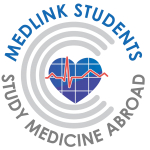
Located in: Georgia
















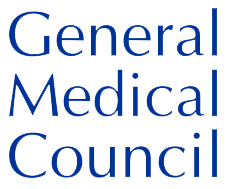





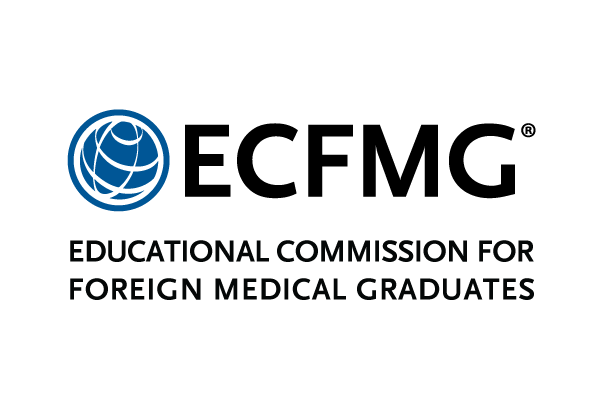



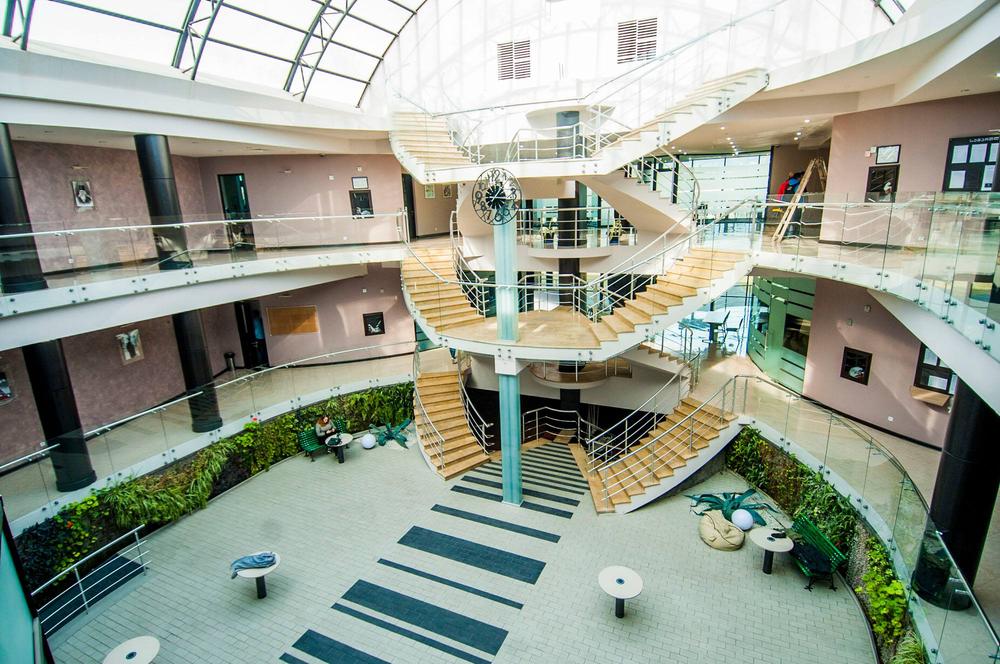



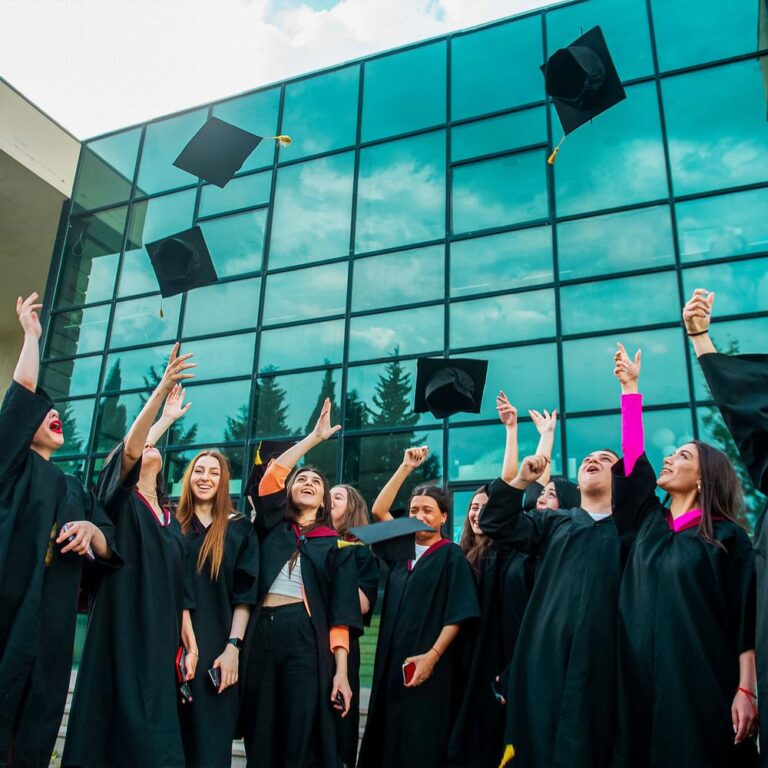

University motto: Scientia et Veritas - Knowledge and truth
Grigol Robakidze University School of Medicine (GRUNI) is a private university founded in 1992 in Tbilisi, Georgia. The university is known for its strong international focus, which prepares students for successful medical careers across the globe.
The university provides students with a modern approach to medical education, including access to advanced teaching facilities and comprehensive clinical training in its own 350-bed Multi Speciality Hospital. The GRUNI School of Medicine offers internationally recognised degrees that are taught by highly qualified professionals in a supportive and research-driven environment.
The medical programme is developed to meet and exceed international standards, supported by thorough Quality Assurance programmes. The university has a strong focus on practical experience and innovation, ensuring that graduates become well-prepared professionals ready to face the challenges of the medical profession.
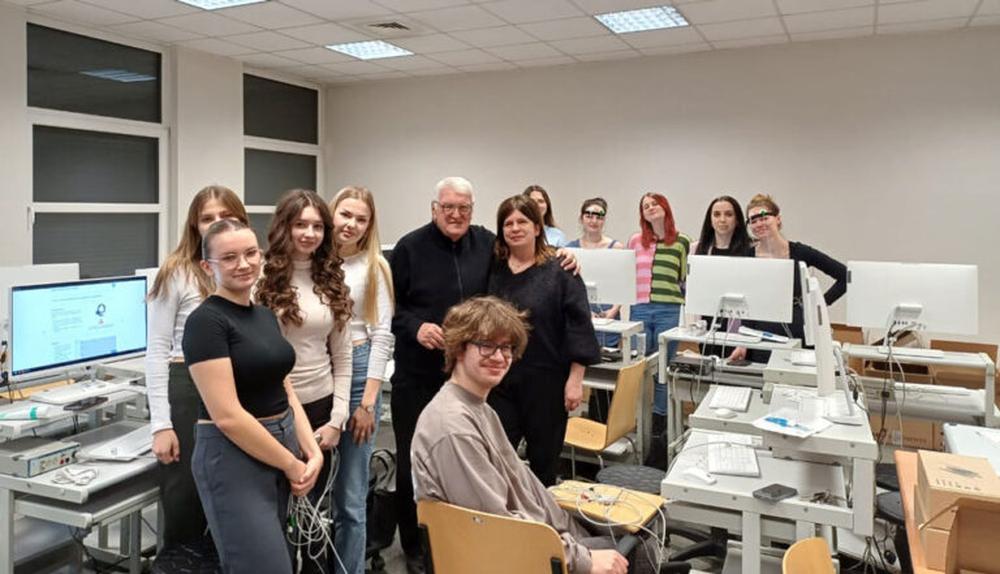

Grigol Robakidze University offers a comprehensive 6-year MBBS programme in English designed to train competent and knowledgeable medical professionals who can succeed on a global scale. The curriculum combines theoretical education with extensive practical experience, focusing on the development of essential clinical skills and interpersonal skills.
The programme uses the European Credit Transfer System (ECTS), which ensures a fair and transparent assessment framework that facilitates student transfers. The MD programme is worth 360 ECTS credits, as per European standards.
While there are currently no graduate entry options, the university accepts student transfers.
Moreover the university has no entrance exam required.
The Grigol Robakidze University School of Medicine's tuition fees are per year for the medicine course.
To get accepted to the Grigol Robakidze University School of Medicine, students need to have a high school diploma and a strong CV. Additionally, students need to submit translated, certified, apostilled, and notarised documents.
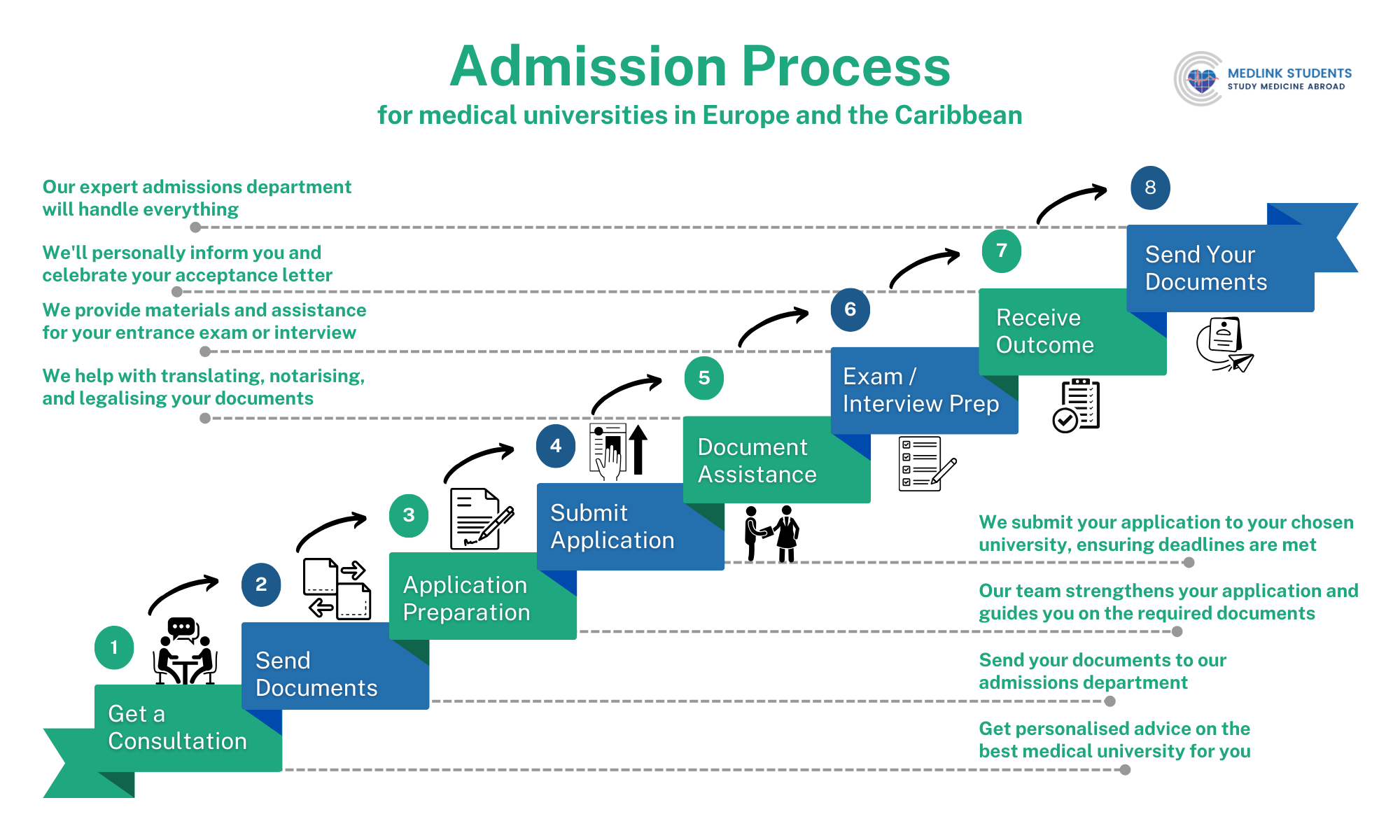

The competition to get accepted into the Grigol Robakidze University is fierce. Not only does the medical school provide exceptional and internationally-focused education, but it also offers very affordable tuition fees. This makes GRUNI one of the top choices for medical education in Europe, attracting thousands of students each year. However, the spots are limited, and the admission requirements ask students to submit a strong CV and a variety of documents with legal requirements. Not following the admission guidelines can result in your application getting rejected. But there’s no need to worry because Medlink Students has one of the best admission teams in Europe. We can handle your application from start to finish, including all the complicated technical legalities, so you can focus on what’s truly important - preparing for your future career in medicine.
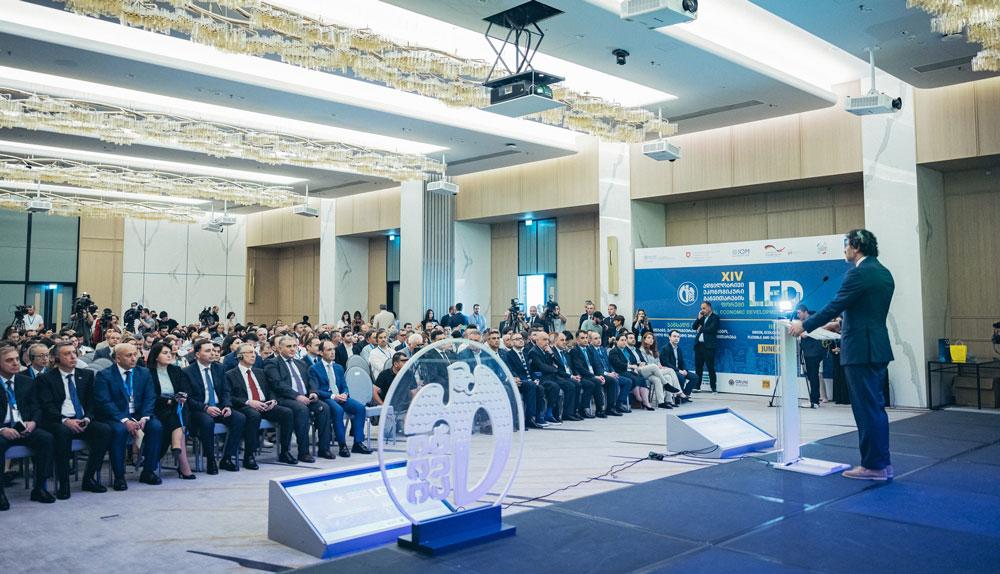

The medicine programme at Grigol Robakidze University is accredited by the Authorisation Board of Higher Educational Institutions, ensuring adherence to national and international educational standards. Additionally, Gruni is certified and accredited by the National Center for Educational Quality Enhancement of Georgia.
GRUNI is also listed in the World Directory of Medical Schools (WDOMS GRUNI), which is co-managed by the World Health Organisation and includes only accredited universities.
Grigol Robakidze University was the first in Georgia to create an Academic Quality Management Centre, which was later renamed the Quality Assurance Service. This service was developed with the support of Nottingham Trent and Lund universities under the EU Tempus TACIS project.
The goals and duties of the Quality Assurance Service include:
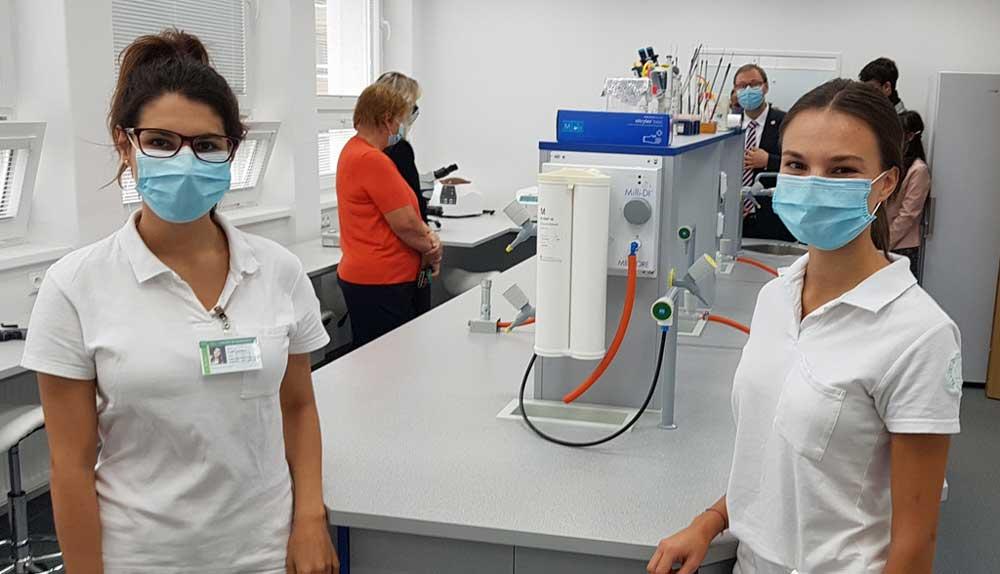

Grigol Robakidze University School of Medicine combines theory and practice to ensure that students can apply foundational medical knowledge in real-world clinical settings. With small class sizes, the university has a student-centred learning environment that promotes individualised attention with active engagement in the educational process.
The programmes encourage students to participate in scientific research to develop critical thinking skills and a passion for innovation. Additionally, an interdisciplinary approach is used to connect various medical disciplines, helping students understand the relationships between different fields of medicine.
With a strong international focus, the curriculum prepares students to excel in diverse healthcare environments worldwide. The university also places a significant emphasis on medical ethics and responsibility, ensuring that graduates are aware of the societal implications of their work in healthcare.
The English Medicine programme at Grigol Robakidze University offers a comprehensive 6-year curriculum for a total of 360 ECTS credits. It’s designed according to international medical education standards, integrating basic and clinical sciences across two main stages: the Initial Medical Stage (1 semester) and the Clinical Medical Stage (11 semesters).
This stage lasts 1 semester (30 credits) and introduces core biomedical sciences. Students gain foundational knowledge in human anatomy, physiology, histology, and biochemistry, which form the base for further clinical study. At this stage, students learn the core of scientific research methods, health promotion basics, and professional Latin terminology, setting the stage for the more advanced modules ahead.
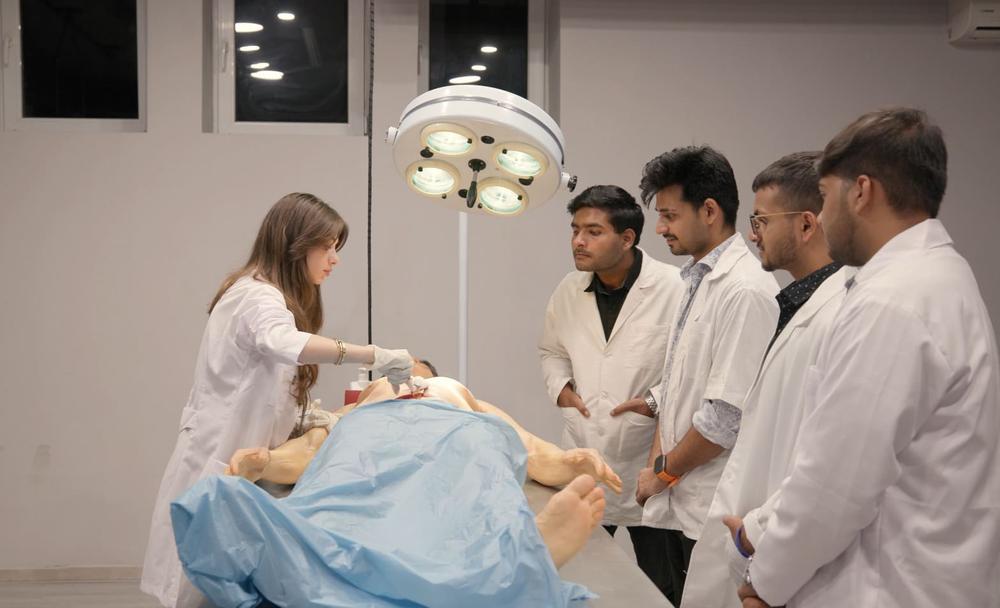

This stage spans 11 semesters (330 credits) and consists of integrated blocks and clinical rotation cycles. In the integrated blocks, students get a deeper understanding of the molecular, cellular, and organ systems and link them with disease mechanisms.
The modules at this stage cover core clinical sciences like pathology, immunology, microbiology, and clinical communication skills. The emphasis is on applying this knowledge to patient care and developing a deep understanding of disease treatment.
The Transition Block, taking place in the 6th semester, bridges theoretical learning and practical applications. Students focus on diagnosis, patient examination, and using evidence-based medicine in clinical practice. This phase helps sharpen students’ clinical reasoning and decision-making skills through case-based learning and practical patient engagement.
From the 7th to 12th semesters, clinical rotations give students the opportunity to apply their academic knowledge in real-life settings, rotating through various medical specialities. Each semester carries 30 credits, and students work as part of medical teams, gradually taking on more responsibility, from assisting to performing essential medical duties under supervision.
The rotations are designed to deepen clinical knowledge, refine practical skills, and build the professional values that are crucial for a successful medical career.
Upon graduation, students get an internationally recognised medical degree that allows them to apply for residency options throughout Europe, USA, India, Australia, New Zealand, and many more.
The Advanced Simulation Lab at GRUNI is the largest and one of the most advanced in Georgia. It provides medical students with a wide range of advanced simulators and gives them access to the latest technologies used in healthcare.
These tools allow students to understand critical medical scenarios better and gain hands-on experience before moving on to practical training with actual patients. The use of simulators offers a modern approach to medical education, which supplements traditional cadaver-based learning.
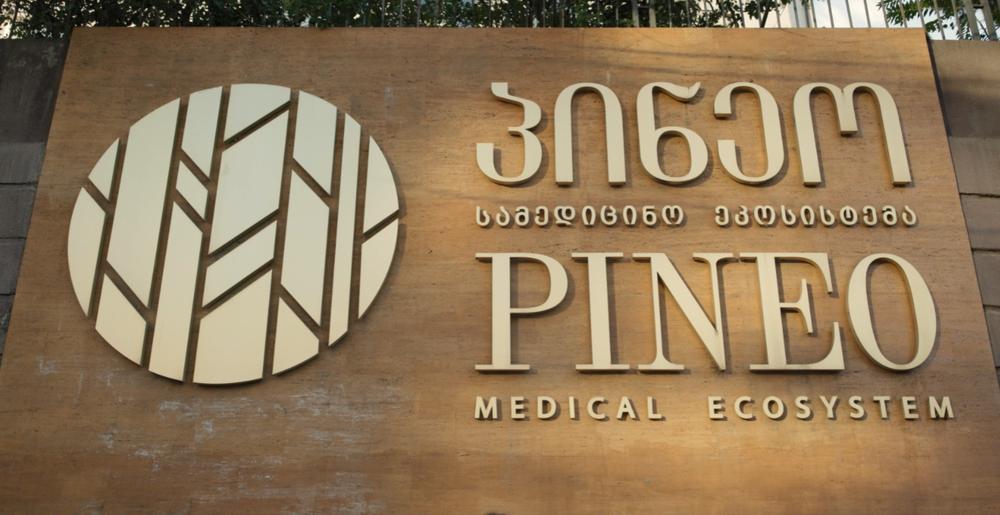

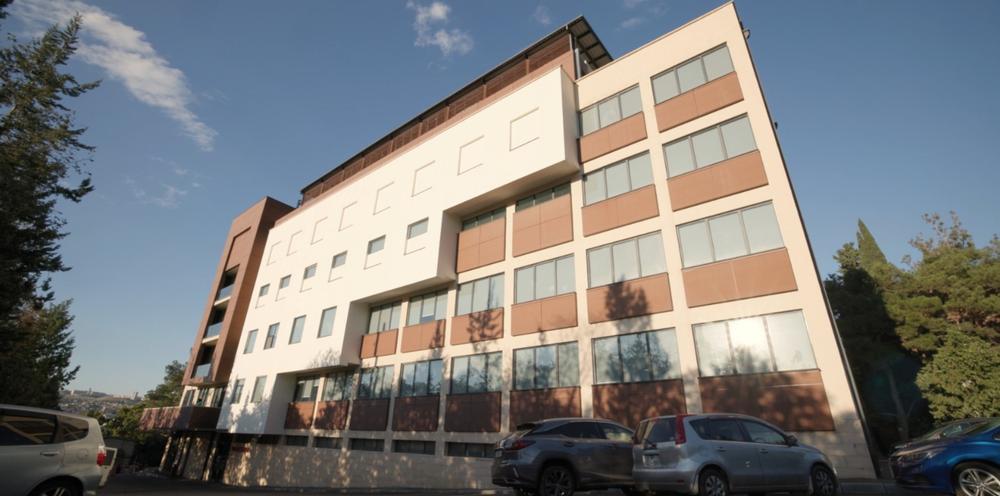

The Multi Speciality Hospital "PINEO" is a modern medical facility that offers a wide range of healthcare services. The hospital equipped with 350 beds and treats over 1,000 patients daily.
Students from Grigol Robakidze University actively participate in clinical training here, gaining hands-on experience through patient interaction, diagnosis, and treatment across various specialities under the supervision of qualified professionals. This direct involvement in patient care ensures that students develop practical skills and are well-prepared for their medical careers in real-world healthcare environments.
Grigol Robakidze University provides opportunities for global exposure to its students through academic and research partnerships with Austria, Germany, Poland, and more.
The university's association with the Bologna Process allows its medical programmes to align with European educational standards, which creates opportunities for students to participate in academic exchanges and collaborative research with many European universities.
These partnerships also contribute to the development of research skills among students and faculty through co-hosted conferences, shared resources, and involvement in international projects, which include:
These partnerships provide students with opportunities to participate in international seminars, exchange programmes, and collaborative research projects, preparing them for successful global careers.
Research at Grigol Robakidze University School of Medicine is mainly focused on advancing medical knowledge and addressing real-world healthcare challenges. Key components of the university's research activities include:
The university is dedicated to training highly qualified specialists in medicine while also establishing and maintaining a strong scientific research presence.
With the vision of "University Without Borders," the GRUNI seeks to meet local and international educational demands while maintaining high academic standards and leadership in global university policy.
Grigol Robakidze University offers modern student housing options, which include furniture, heating, air conditioning, internet, and washing machines. The student hostel is located 10 minutes away from the GRUNI campus and costs about per month.
Tbilisi, the capital of Georgia, is known for its stunning landscapes, rich history, and welcoming atmosphere. Located right at the crossroads of Europe and Asia, Tbilisi offers an exceptional blend of cultures, making it an interesting and exciting destination for international students.
While studying here, students get to enjoy:
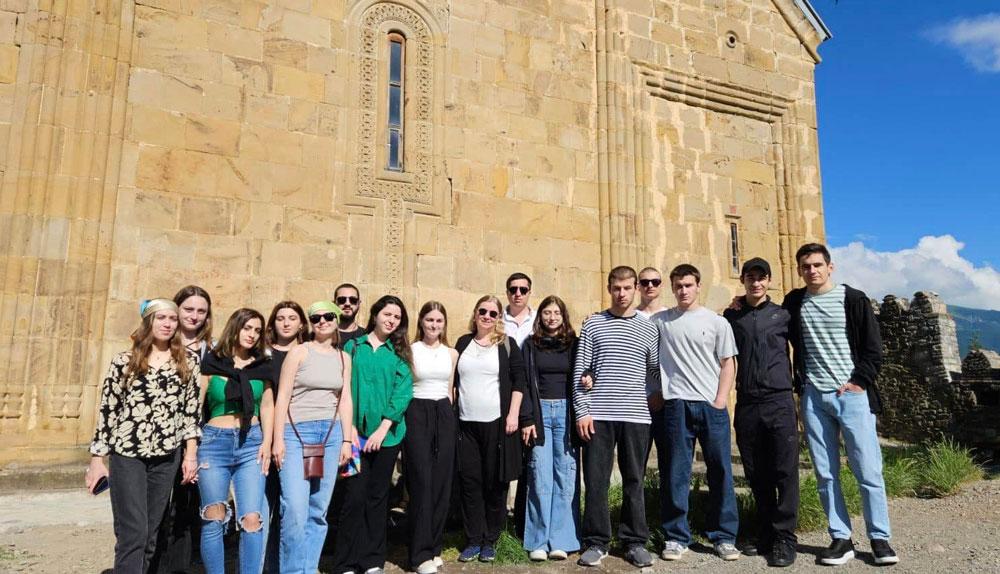

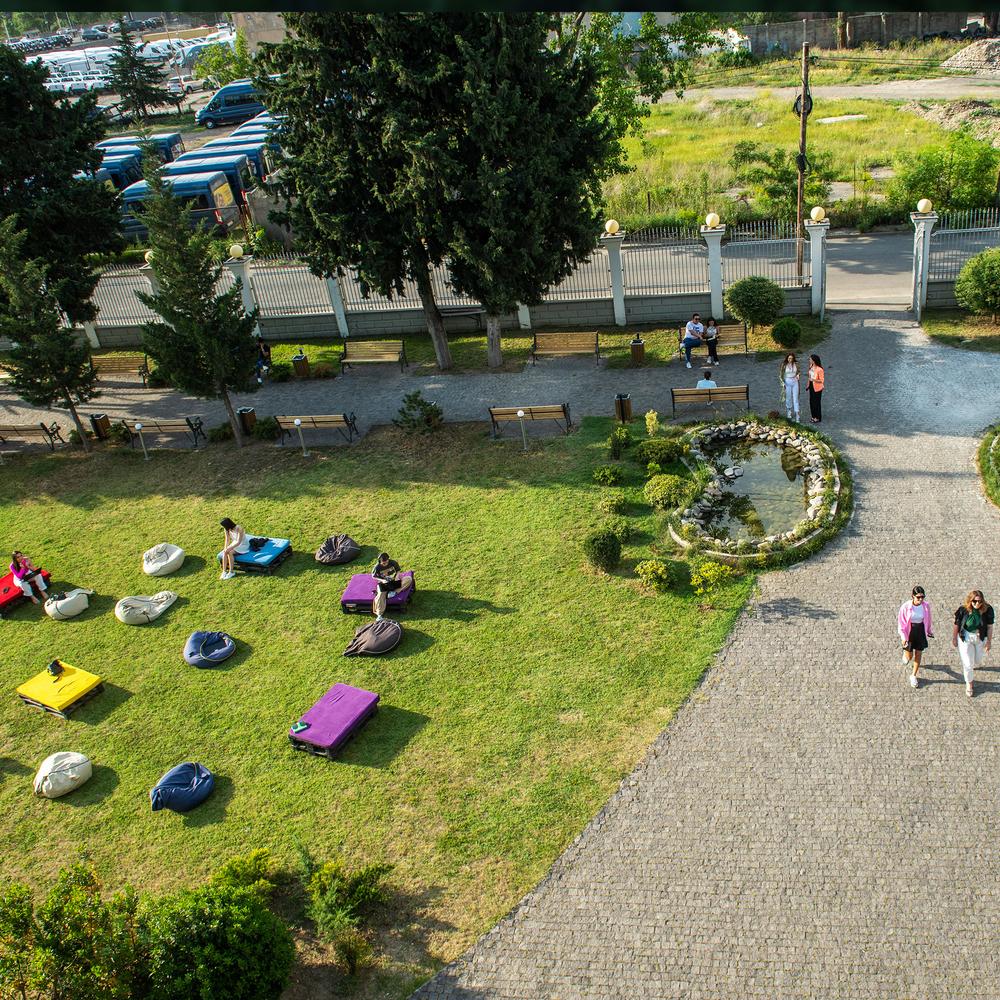

Tbilisi is surrounded by beautiful hills and mountains, offering easy access to outdoor activities like hiking and nature walks. The nearby national parks and picturesque views of the Kura River greatly contribute to the city's charm.
The Georgian people are known for their hospitality, creating a welcoming atmosphere for international students. This friendly environment makes it easy to feel right at home while creating lifelong friendships with local and international students alike.
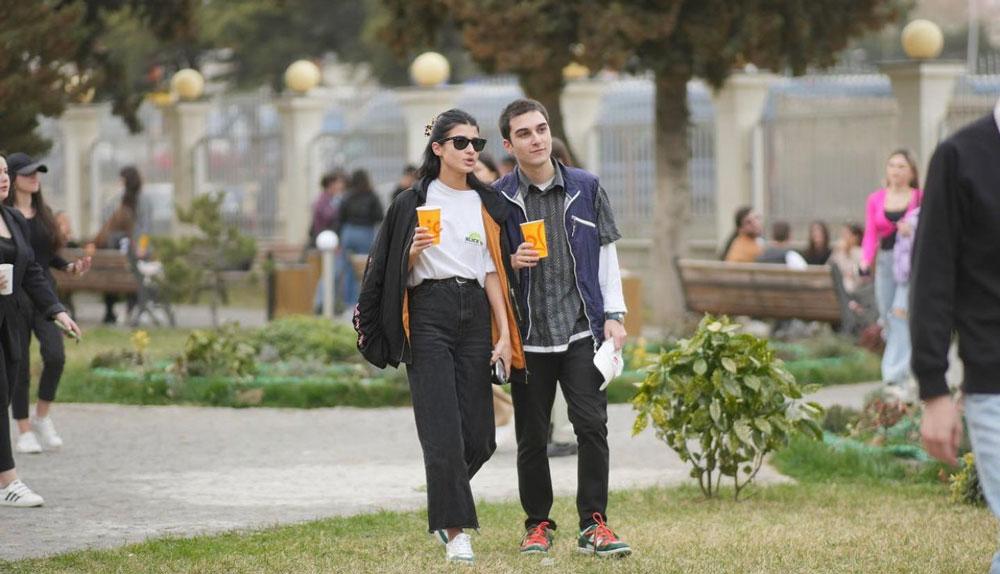

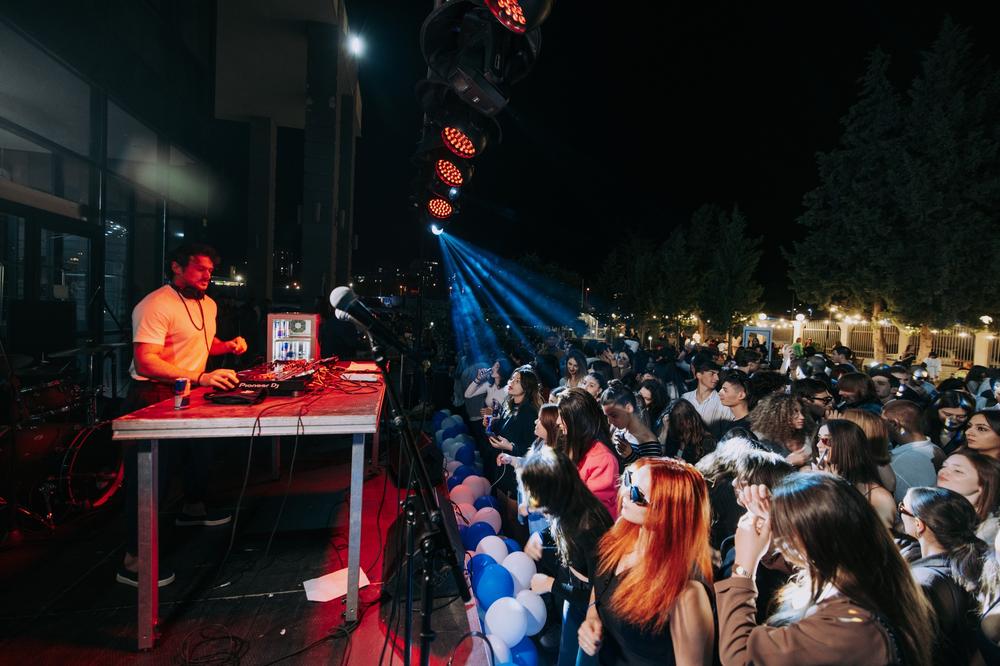



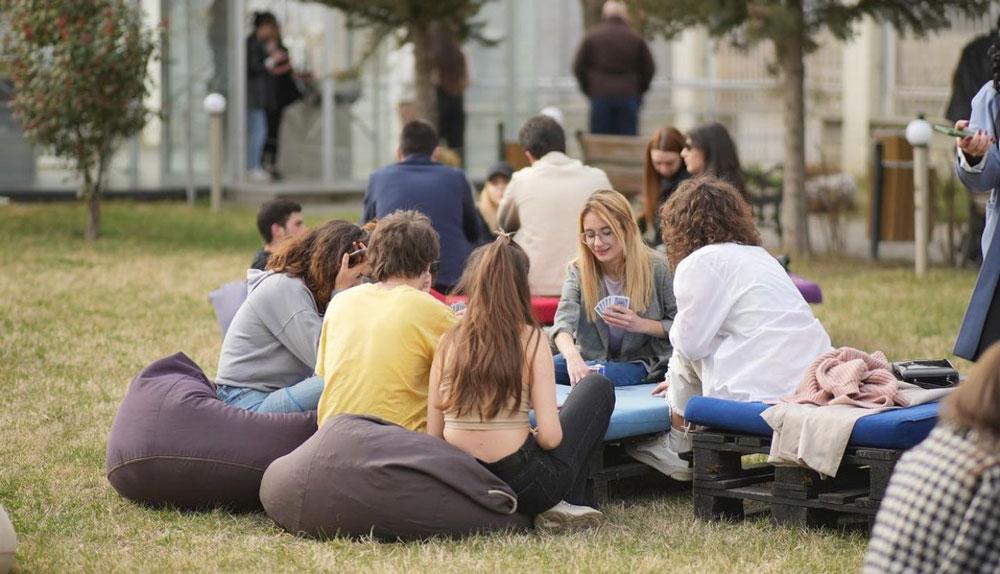

Tbilisi hosts a variety of cultural festivals and events throughout the year, showcasing traditional music, dance, and local cuisine. These events provide students with new experiences and opportunities to learn more about the history and culture of Georgia.
Students in Tbilisi enjoy a high standard of living, with affordable accommodation, transportation, and daily expenses. This cost-effectiveness allows students to confidently focus on their studies without worrying about breaking the bank.
Diversity and inclusion are core values at Grigol Robakidze University and in Georgia as a whole. Known for its history of hospitality, Tbilisi welcomes students from all backgrounds, creating an environment where everyone feels respected and valued, including hijabi women.
This commitment to inclusivity fosters a fulfilling and enjoyable atmosphere that enhances the overall student experience.Tbilisi also offers a range of places of worship, including churches, mosques, synagogues, and other religious sites, ensuring that students can freely practice their faith. The city’s dining scene is also enriched by its multicultural society, which offers halal, kosher, vegetarian, and vegan options.
Grigol Robakidze University also has comprehensive support for Indian students, who will find Tbilisi exceptionally accommodating. The university hostels feature Indian cooks dedicated to preparing authentic meals, helping students from India feel right at home.
Additionally, the city is home to many local Indian restaurants and grocery stores stocked with familiar ingredients, making it easy to enjoy traditional cuisine. Combined with Tbilisi's warm and welcoming atmosphere, these features create a comforting and inclusive environment for Indian students.
Grigol Robakidze University has a strong track record for the FMGE (Foreign Medical Graduates Examination), which is critical for medical graduates seeking to practice in India. GRUNI has focused on aligning its curriculum with international standards and accommodates the needs of Indian medical students.
The university’s modern teaching technology and methods, experienced faculty, and emphasis on practical exposure contribute significantly to this success. Students benefit from professional guidance, coaching and resources, which prepare them directly and effectively for the FMGE test.
It is safe to say that Indian students who graduate from Grigol Robakidze University are well-prepared to return home and build successful careers in medicine thanks to the university's comprehensive curriculum, practical training, and alignment with international medical standards.










The Grigol Robakidze University School of Medicine is located in Tbilisi, the capital of Georgia.
Studying medicine at The Grigol Robakidze University School of Medicine costs per year.
Yes, you can transfer to The Grigol Robakidze University School of Medicine.
Yes, you can study medicine in English at The Grigol Robakidze University School of Medicine.
The Grigol Robakidze University School of Medicine is accredited by the Authorisation Board of Higher Educational Institutions and the National Center for Educational Quality Enhancement of Georgia. Additionally, it is internationally recognised, and its Quality Assurance programmes ensure that it follows the strict European educational standards.
No, an entrance exam isn’t required to get admitted to The Grigol Robakidze University School of Medicine.
Yes, you can study at The Grigol Robakidze University School of Medicine.
Typically, clinical rotations are carried out in the university’s very own multi-speciality hospital and various leading hospitals and clinics.